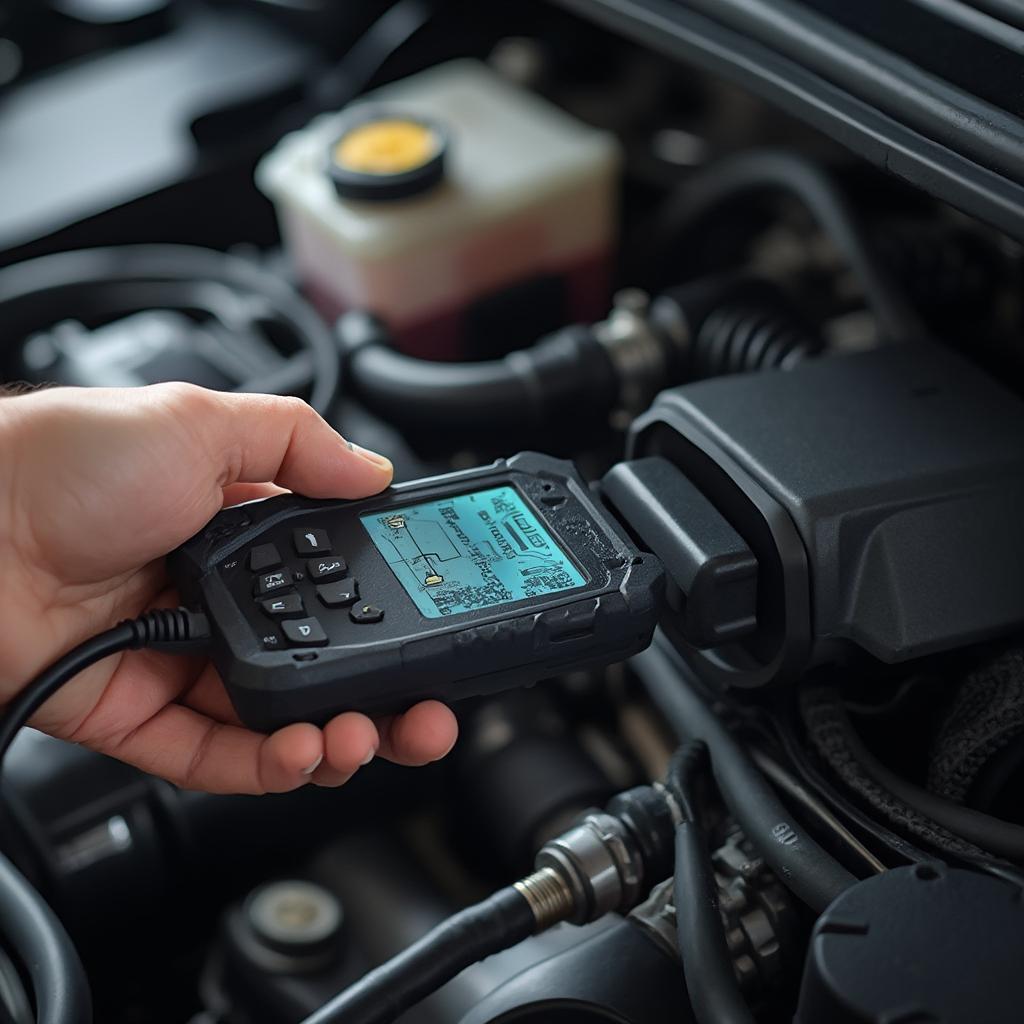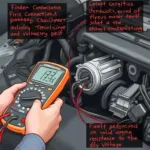How accurate is OBD2? This is a common question among car owners and mechanics alike. On-board diagnostics (OBD2) has become an essential tool for understanding and maintaining vehicle health. But just how reliable is the information it provides? This article dives deep into the accuracy of OBD2 scanners, exploring their capabilities, limitations, and the factors that can influence their readings. Let’s uncover the truth about this powerful diagnostic technology.
Understanding OBD2 Accuracy: What Can You Really Rely On?
OBD2 scanners are designed to retrieve diagnostic trouble codes (DTCs) from a vehicle’s onboard computer. These codes indicate potential problems within various systems, such as the engine, transmission, emissions, and more. The accuracy of these codes is generally very high, meaning they reliably point to the area of concern. However, a DTC doesn’t necessarily pinpoint the exact faulty component. Think of it like a doctor telling you which part of your body is hurting – they may identify the general area, but further investigation is needed for a precise diagnosis. Similarly, OBD2 codes provide a starting point for troubleshooting, not the final answer. For accurate mileage tracking, consider an OBD2 mile tracker for your needs.
Furthermore, the accuracy of the data retrieved, such as sensor readings, can vary depending on several factors. The quality of the OBD2 scanner itself plays a significant role. Cheap, generic scanners may not always provide accurate data or be compatible with all vehicle makes and models. Investing in a high-quality scanner, even if it’s from a reputable app like the iCar Connect OBD2 accurate app, is often worth it for reliable readings.
Factors Influencing OBD2 Accuracy: Beyond the Scanner
Beyond the scanner, other factors can influence the accuracy of OBD2 readings. One crucial aspect is the vehicle’s onboard computer itself. While rare, computer malfunctions can lead to inaccurate data being generated and relayed to the scanner. Likewise, faulty sensors can provide incorrect information to the computer, resulting in misleading DTCs or data readings. Imagine a faulty thermometer telling you it’s freezing outside when it’s actually a pleasant summer day. The thermometer isn’t necessarily broken, but the sensor providing the temperature information is malfunctioning, leading to an inaccurate reading.
Another important consideration is the proper use of the scanner. Incorrectly connecting the scanner or misinterpreting the data can lead to incorrect conclusions. Understanding the specific protocols and data parameters for your vehicle is crucial for accurate diagnosis. This is especially important when dealing with specific vehicle brands, such as Honda or Subaru, which might have unique OBD2 implementations. You can find more information about OBD2 compatibility for these brands in our OBD2 Honda Subaru guide.
How Accurate is OBD2 for Speed Measurement?
While OBD2 is not primarily designed for speed measurement, it can provide speed data from the vehicle’s speed sensor. This data can be relatively accurate but may not be as precise as a dedicated speedometer. Factors like tire size and sensor calibration can influence the accuracy of OBD2 speed readings. For more details on obtaining accurate speed readings through OBD2, check out our article on the most accurate OBD2 speedometer. It provides valuable insights and recommendations for those seeking precise speed information.
Common Misconceptions about OBD2 Accuracy
A common misconception is that OBD2 can diagnose every car problem. While it covers a wide range of systems, some issues might not trigger DTCs or be detectable through OBD2. Mechanical problems, like worn brakes or a failing suspension component, often require physical inspection. Additionally, some specific error codes like OBD2 P404 require more in-depth diagnostics beyond simply reading the code. Our article on OBD2 P404 can provide more insight into this specific error code.
Conclusion: Trusting the Insights of OBD2
So, how accurate is OBD2? While it’s not a foolproof solution for every car problem, it offers valuable insights into your vehicle’s health. The accuracy of the information depends on the quality of the scanner, the condition of the vehicle’s systems, and the user’s understanding of the data. By using a reliable OBD2 scanner, interpreting the information carefully, and understanding its limitations, car owners and mechanics can leverage this powerful technology for accurate diagnostics and effective vehicle maintenance. Remember to check out our iCar Connect OBD2 accurate app for a reliable OBD2 solution.
FAQ: Addressing Common OBD2 Accuracy Concerns
- Can OBD2 detect all car problems? No, OBD2 primarily detects issues related to the engine, transmission, and emissions systems. It may not detect all mechanical problems.
- Is a cheap OBD2 scanner reliable? While cheaper scanners can provide basic information, investing in a high-quality scanner ensures more accurate and reliable data.
- Can I rely on OBD2 for accurate speed readings? OBD2 speed data can be relatively accurate but might not be as precise as a dedicated speedometer.
- What should I do if my OBD2 scanner shows a code I don’t understand? Consult a qualified mechanic or refer to reputable online resources for further information.
- How often should I use my OBD2 scanner? Regularly scanning your vehicle, especially before long trips, can help identify potential problems early on.
- Do all cars have OBD2 ports? Most cars manufactured after 1996 in the United States and after 2001 in Europe are equipped with OBD2 ports.
- Can I use any OBD2 scanner on my car? While most scanners work with a wide range of vehicles, some scanners are specifically designed for certain makes and models.
Need assistance with your car diagnostics? Contact us via WhatsApp: +1(641)206-8880, Email: cardiagtechworkshop@gmail.com, or visit our office at 789 Elm Street, San Francisco, CA 94102, USA. Our 24/7 customer support team is ready to help.

